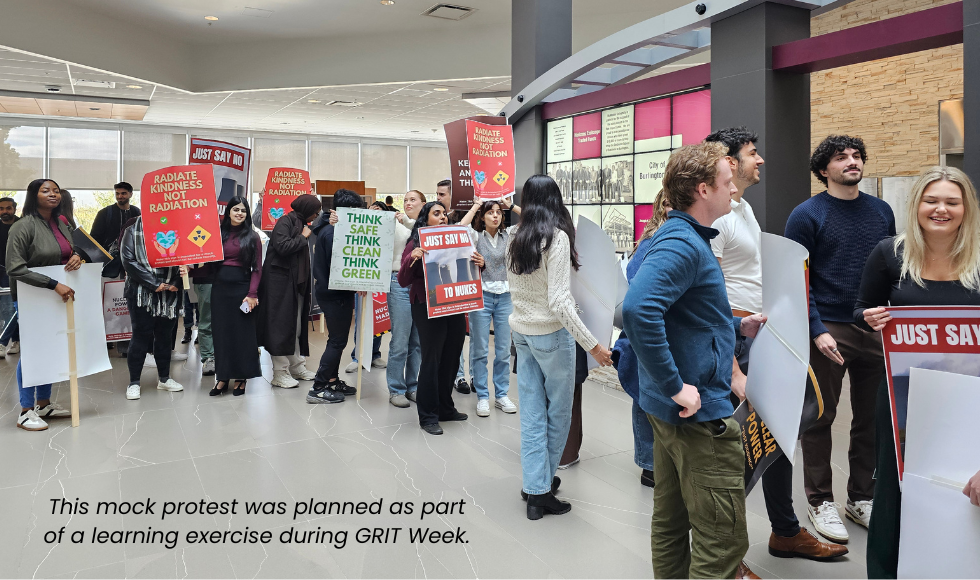Business students tackle anti-nuclear misinformation in immersive learning exercise

Stop nuclear power. Green is clean, nuclear is mean. Nuclear power: A dangerous gamble.
Mock protestors shouted these bold anti-nuclear statements as part of an immersive learning exercise held at the Ron Joyce Centre in Burlington.
The ‘protestors’ interrupted a lecture attended by first-year MBA students. Students were then ushered into a crisis response management session, which asked them to develop a plan to address protestors’ concerns about nuclear energy.
The DeGroote School of Business, in collaboration with McMaster’s Nuclear Operations & Facilities, organized the hands-on learning activity as part of GRIT week.
GRIT week is a four-day, live case experience designed for all first-year MBA students, with the goal of Generating Resilient Integrative Thinkers.
The exercise gave students a chance to collaborate on a complex, real-world business problem that lacks a straightforward solution, says Assistant Professor of Strategic Management, Paul Snowdon.
“Leading through crisis and stressful events is a skill every leader must master, yet so few have the opportunity to develop these skills before they are needed in an actual crisis,” he explains.
“In the crisis communications workshop, we did exactly that – we orchestrated a mock-protest to re-create the urgency of a crisis and simulate the real-world dynamic where events unfold rapidly. This scenario not only provided a low-risk environment for students to practice crisis communication and leadership skills, but also deepened their understanding that any crisis, large or small, needs to be managed. And that ultimately, how they manage a crisis will strongly influence how they are perceived as a leader.”
As the global need for reliable clean energy sources grows more and more urgent, public awareness and perception around nuclear energy is an especially relevant topic for students to explore, says Manager of Nuclear Education and Outreach, Erica Dao.
“Despite countless technological advancements that have only made nuclear technologies safer and more efficient over the years, nuclear misinformation still proliferates around the world today. This protest may have been fake, but it represents a real concern for nuclear research and industry leaders who are doing important work that has the power to revolutionize the clean energy transition,” she says.
Last year, COP28 recognized nuclear energy as playing a critical role in the world’s clean energy future and in reducing the effects of climate change. Here in Ontario, over 50 per cent of the province’s energy is provided by nuclear, and McMaster plays a key role in supporting the industry through research and education.
Dao says creative, impactful solutions that combat nuclear misinformation and spark meaningful discussions about clean energy are needed now more than ever.
When asked about their familiarity with nuclear power and SMRs before GRIT week, MBA student Harman Kaur Batra said, “It was absolutely new to me. All that I knew was what was going on in the news, nothing in detail why nuclear energy is good or should it even be used for regular day to day purposes or not. So, I believe a lot of my own myths were shattered during this process.”
“This year’s GRIT Week on SMR and nuclear energy provided an impactful learning experience, focusing on a field that is shaping the future of energy,” said MBA student Prasha Sivasundaram.
“There is no doubt that nuclear energy is paving the way for sustainable power sources, as companies like Amazon, Microsoft, and Google embrace the development of new nuclear technologies. Throughout this intensive week, I not only learned about nuclear energy’s future but also experienced significant personal growth, embodying the spirit of GRIT – Generating Resilient Integrative Thinkers.”
Throughout GRIT week, students engaged in multiple learning exercises related to business challenges in nuclear research and industry. Read more about GRIT week here.
News